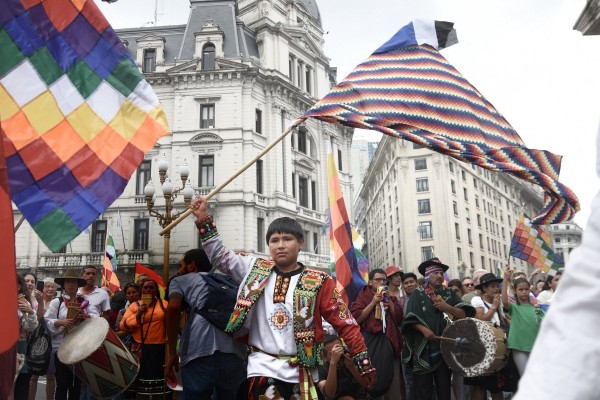What will it take to transform Canada’s foreign policy for the better?
If we want a foreign policy based on peace, human rights and care for the planet, the only way forward is to organize

With Canada suffering two consecutive defeats in its effort to gain a UN Security Council seat, the time has come to fundamentally reassess Canadian foreign policy, writes Bianca Mugyenyi .Photo by Rebecca Schley/Flickr.
This Thursday will mark one year since Canada was defeated in its bid for a seat on the United Nations Security Council. The Trudeau government’s loss marked a rejection of its pro-Washington, militaristic and anti-Palestinian policies.
In the months before the vote, a half-dozen activists launched #NoUNSC4Canada. The social media campaign criticized Canada’s climate, nuclear and mining policies as well as its destructive role across the Global South in countries like Bolivia, Haiti and Venezuela. The campaign also included a widely circulated public letter focused on Canada’s anti-Palestinian policies as well as letters sent to African and Caribbean ambassadors critical of Canada’s role in those regions.
In the aftermath of the Security Council defeat, Nino Pagliccia, a well-known social justice activist and writer, made an apt observation about the political message it sent. “The international community has not given a vote of confidence to Canada’s foreign policy by denying it a seat to the UNSC,” he explained. “That’s all that the international community can do. It is now up to Canadians to demand changes to the Canadian government.”
The Canadian Foreign Policy Institute (CFPI) has taken that message to heart. Immediately after the defeat we released an open letter calling for a “fundamental reassessment of Canadian foreign policy.” It was endorsed by 50 groups including Greenpeace Canada, MiningWatch Canada, and the Vancouver District Labour Council, and signed by nearly 2,000 individuals, including four sitting MPs and four former MPs, as well as renowned environmentalist David Suzuki and bestselling author Naomi Klein, among others.
Over the past year CFPI has published dozens of op-eds and participated in countless webinars and other actions challenging unjust Canadian foreign policies. We’ve worked with critical new voices such as World Beyond War Canada and the Canadian Latin American Alliance as well as more established groups such as Common Frontiers and Independent Jewish Voices.
Since the Security Council defeat there has been a real, if slight, shift in the foreign policy discourse in this country. After the Movement for Socialism party won the November presidential elections in Bolivia, for instance, there was a wave of criticism of Canadian support for the coup against Evo Morales the previous year. There was also significant support for a February CFPI statement criticizing Canada’s “support for a repressive, corrupt Haitian president devoid of constitutional legitimacy.”
In recent weeks thousands have been brought onto the streets against Israeli violence by newer groups such as the Palestine Youth Movement and Samidoun. The protests have highlighted Canada’s complicity in Palestinian dispossession, prompting even a number of Liberal MPs to publicly criticize the government’s position. Some of them have also echoed the growing calls—led by the Toronto-based Hiroshima Nagasaki Day Coalition—demanding Ottawa sign the UN Nuclear Ban Treaty.
At the recent federal NDP convention a group of young activists successfully passed a resolution in favour of an arms embargo on Israel and sanctions on settlement products. Some of the party’s MPs have also taken forceful positions against Canadian policy towards the Organization of American States, and punitive, unilateral sanctions aimed at Venezuela.
In the Green Party, MP Paul Manly has sponsored a number of internationalist parliamentary petitions. In the House of Commons in November, Manly gave the government’s foreign policy a failing grade. In his words:
Canada has failed to meet our commitments to foreign aid, we have failed to meet our commitments to climate action, we are the 15th largest arms exporting nation, we are considering purchasing offensive F-35 stealth fighter jets, we have engaged in NATO wars of aggression and regime change, we haven’t signed the Treaty on the Prohibition of Nuclear Weapons and we recently failed to gain a seat on the UN Security Council. Will the government conduct a full review of Canadian foreign policy and the role this country plays in world affairs. On foreign affairs we are getting an F.
To mark the one-year anniversary of Canada’s defeat in its bid for a seat on the UN Security Council, CFPI will be hosting an event titled “International Solidarity Now: A gathering for a more just Canadian foreign policy.” The online seminar will include short presentations from filmmaker Avi Lewis, legendary Toronto organizer John Clarke, Halifax poet El Jones and numerous organizations challenging different elements of Canada’s foreign policy. The aim is to connect, strengthen and amplify our collective efforts.
While difficult to sustain, it is grassroots anti-war and international solidarity activism that will change Canadian foreign policy for the better.
As Pagliccia pointed out, the international community’s rejection of Canada’s bid for a seat on the UN Security Council was a message to Canadians to demand better from our government.
If we want a foreign policy based on peace, human rights and care for the planet, the only way forward is to organize.
You can register for the CFPI’s upcoming event by clicking here.
Bianca Mugyenyi is an author, activist and director of the Canadian Foreign Policy Institute. She is based in Montréal.










